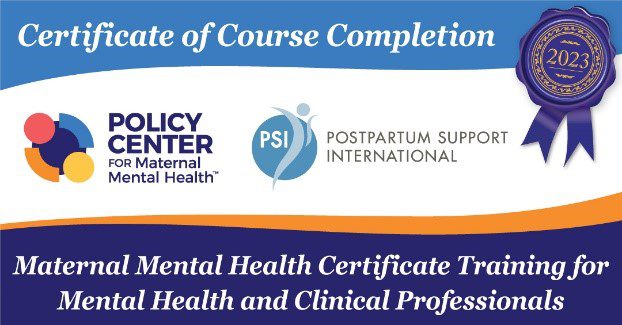Pregnancy & Postpartum Therapy
As a psychologist specializing in pregnancy and postpartum care, my focus is on supporting individuals and couples as they navigate the emotional challenges associated with the journey to parenthood. Whether you’re expecting, trying to conceive, experienced a pregnancy loss (miscarriage) or adjusting to the postpartum period, I provide a safe and empathetic space to explore the unique psychological aspects of this transformative experience. From addressing anxieties and mood changes during pregnancy to helping new parents navigate the complexities of postpartum emotions, my goal is to foster mental well-being and resilience. Through personalized counseling, we work collaboratively to navigate the emotional terrain, enhance coping strategies, and strengthen the foundation for a positive and healthy transition to parenthood.
Schedule a Therapy Appointment
I offer therapy sessions both online and in person. Many of my clients opt for hybrid sessions, where we meet in person when it is convenient and fits into your schedule and we meet virtually or online for flexibility purposes. I also offer in-home sessions for individuals with disabilities, personal reasons, or for parents with young children.
Let’s take the first step in achieving your goals and gaining treatment support.

My Approach to Pregnancy & Postpartum Therapy
I have specific training in Maternal Mental Health, Pregnancy and Postpartum Care, and Pregnancy Loss / Miscarriage. Pregnancy and postpartum therapy employs a compassionate and individualized approach to address the unique emotional and psychological needs of individuals navigating the postpartum period. Grounded in evidence-based methods, I will guide discussions on the challenges of new parenthood, offering strategies to cope with postpartum depression, anxiety, and the myriad adjustments that come with this life transition. Sessions often involve exploring changes in identity, relationships, and the impact of parenting on mental health. I may integrate various therapeutic modalities, including cognitive-behavioral techniques, interpersonal therapy, and mindfulness practices, to support you in building resilience, fostering self-care, and navigating the complexities of the postpartum experience. The goal is to provide a supportive space where individuals can openly express their concerns, gain valuable insights, and develop practical tools for emotional well-being during this transformative period.
mental health issues can impact new mothers
Pregnancy and postpartum are times of significant physical and emotional changes, and maternal mental health is crucial for the well-being of both the expectant mother and the developing baby. Several mental health disorders can affect pregnant and postpartum individuals, and it’s essential to recognize and address them for optimal maternal and infant outcomes. Some common maternal mental health disorders during pregnancy and postpartum include:
Prenatal depression and postpartum depression or baby blues can affect a woman's mood, energy levels, and ability to cope with daily life. Symptoms may include persistent sadness, changes in sleep and appetite, and a loss of interest in activities.
Generalized anxiety disorder, panic disorder, and specific phobias are among the anxiety disorders that can manifest or exacerbate during pregnancy. Excessive worry, restlessness, and physical symptoms like palpitations are common.
Some individuals may experience obsessive thoughts or engage in compulsive behaviors related to pregnancy or the baby. These symptoms can be distressing and impact daily functioning.
Pregnant individuals who have experienced trauma, such as a previous difficult birth or other life events, may develop PTSD symptoms during pregnancy. Flashbacks, nightmares, and hypervigilance are common manifestations.
Women with bipolar disorder may experience shifts in mood during pregnancy. Managing medication and monitoring mood fluctuations is crucial for both the mother and the baby's well-being.
Pregnancy can pose unique challenges for individuals with a history of eating disorders. Conditions like anorexia nervosa, bulimia nervosa, or binge eating disorder may require specialized care during pregnancy.
Although rare, some individuals may experience psychotic symptoms during pregnancy. Disorders such as schizophrenia can impact a woman's perception of reality and may require urgent intervention.
Significant life changes, including the anticipation of becoming a parent, can trigger adjustment disorders. Symptoms may include sadness, anxiety, or difficulty coping with the upcoming changes.
men can experience mental health challenges during pregnancy and postpartum
The mental health of new fathers is an important aspect of the postpartum period that is increasingly recognized. While much attention has traditionally focused on maternal mental health, it’s crucial to acknowledge that fathers can also experience various mental health challenges during this significant life transition. Some common mental health issues that new fathers may face include:
Customized Therapy Schedule Options
- Duration: 50 Minute Sessions
- Frequency: Typically weekly sessions
- Format: In-person, virtual, or hybrid
- Duration: 100 Minute Sessions
- Frequency: Weekly or as needed
- Format: In-person, virtual, or hybrid
- Duration: 50 Minute Sessions
- Frequency: 2-3 sessions per week
- Format: In-person, virtual, or hybrid
- Duration: 50 Minute Sessions
- Frequency: Weekly
- Format: In-person
FAQ Pregnancy & Post Partum Therapy
The duration of therapy varies widely and is influenced by factors such as the nature of the issues being addressed, the goals of therapy, and individual progress. Some individuals find relief and achieve their goals in a relatively short time, such as a few weeks or months, particularly when focused on specific concerns or skill-building. Others may engage in longer-term therapy, spanning several months or even years, especially when addressing complex issues, personal growth, or longstanding patterns.
The frequency of sessions also plays a role; weekly sessions are common, but some people may choose to attend therapy less frequently. Additionally, different therapeutic approaches may have varying timeframes.
Ultimately, the decision of how long therapy lasts is a collaborative one between the individual and the therapist. Regular assessments and discussions about progress and goals can help determine the most effective and suitable duration for each person’s therapeutic journey.
I offer therapy sessions both online and in person. Many of my clients opt for hybrid sessions, where we meet in person when it is convenient and fits into their schedule and we meet virtually or online for flexibility purposes. I also offer in-home sessions for individuals with disabilities, personal reasons, or for parents with young children.
The information shared between yourself, and your therapist is confidential with a few exceptions. The exceptions are:
- Known and suspected child and elder abuse
- Danger to yourself or another or gravely disabled
- Duty to Warn: if you report a serious, imminent physical violent act towards yourself or other(s)
- Court order demanding release of information
- Clients under the age of 12
I do not accept any type of health insurance at this time. All therapy sessions are out of pocket or self-pay; however, you can use your HSA account. I can provide you with a super bill, which is an itemized medical receipt that you can submit to your insurance company for partial reimbursement.


“Doubting yourself is normal. Letting it stop you is a choice.” – Mel Robbins
Schedule A Counseling Appointment
Contact me today to schedule a consultation or to ask any questions you may have about my services. I am dedicated to helping you achieve your goals and live a happier life.

